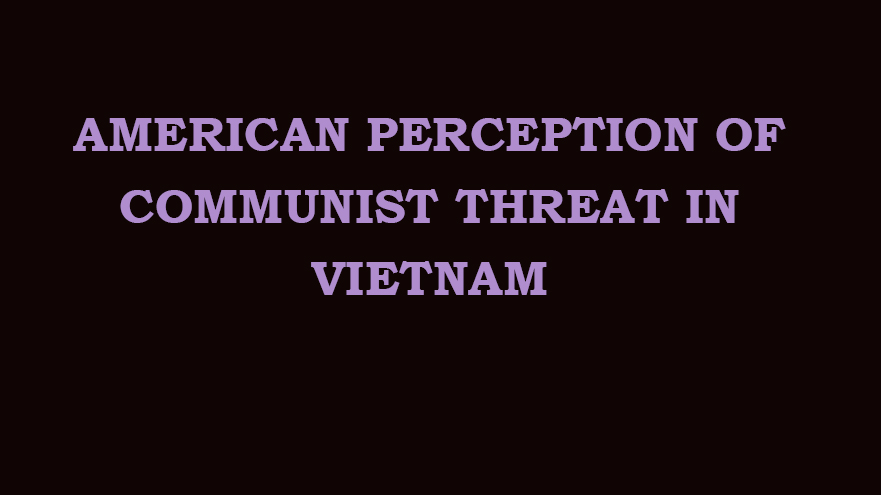
AMERICAN PERCEPTION OF COMMUNIST THREAT IN VIETNAM
The special committee report on Southeast Asia Part II of April 5, 1954 set forth two additional factors which were not covered by the NSC 5405. According to the Report even though the U.S. might obtain a satisfactory solution to the Indochinese war, the communist threat to Southeast Asia would continue as a major obstacle to the U.S. policy and objectives in Southeast Asia. But if Indochina were to fall under communist domination the threat of communist domination in Southeast Asia would be definitely increased. The committee reiterated the belief that in order to prevent the communist domination of Southeast Asia, the Vietminh in Indochina was to be defeated. The committee recommended that the Western position in Indochina had to be improved by a military victory against the Vietminh. Thus, the committee suggested that the U.S. take all affirmative and practical steps to provide tangible evidence of Western strength and determination to defeat communism (see pp. Gravel ed. Vol.I. pp.472-474). As the Vietminh communist power was concentrated in Vietnam, for defeating the Vietminh the U.S. had to concentrate its efforts in Vietnam.
Indochina was considered as the area where international communism most vigorously sought to expand (DSB June 28, 1954. p.971). The U.S. concluded that the Vietminh victory in Vietnam could lead to the communist domination of Indochina. Hence the French resistance to the Vietminh in Vietnam was considered as the crucial link in preventing the communist domination all of Southeast Asia. Thus, the Eisenhower Administration preferred a military victory against the Vietminh in Vietnam and considered a negotiated settlement as tantamount to a crushing political defeat to the U.S. position in Southeast Asia. Hence the U.S. sought to bolster the French confidence. But the U.S. did not commit ground troops to Vietnam in 1954 to save the French Dien Bien Phu. Diem Bien Phu fell to the communists on May 7, 1954. Subsequently France negotiated a settlement with the Vietminh that partitioned Vietnam at the 17th parallel between the communist North Vietnam and the non-communist South Vietnam.
On July 21, 1954 when the Geneva agreements were concluded, President Eisenhower declared that the agreements contained features which the U.S. did not like. The Geneva Conference was evaluated as a major defeat for the U.S. diplomacy and a potential disaster for the U.S. security interests in the Far East. The progress report on the NSC 5405 stated that the Final Declaration of the Geneva Conference had completed a major forward stride of communism which might gradually lead to the loss of Southeast Asia to communism and hence recorded a serious loss to the ‘Free World’, the psychological and political effect of which would be felt throughout the Far East and around the globe (PP. Gravel ed. Vol. I. PP 176-177; see also Appendix II). The NSC 5429 of August 12, 1954 stated that as a result of the Geneva conference the communists had acquired an “advance salient” in Vietnam which could be used for mounting military and non-military pressures against non-communist areas. As a supporter of the French and the Bao Dai Government the U.S. had suffered a loss of prestige in Asia. The loss of prestige would raise doubts about the capability of the U.S. leadership to check further communist expansion in Asia. As a result of the Geneva Conference the communists would be in a better position to alienate the U.S. from its allies by imputing to the U.S. the motives of extremism, belligerency and opposition to co-existence. At the same time the communists could accentuate their “peace program” and establish close relations with nations of free Asia. Moreover, the communists could increase their military and political prestige in Asia through their proven ability to exploit unstable situations in the Southeast Asian countries without resort to armed attack (See PP. DOD ed. Bk.10. pp.731-741).
Thus, in short, the basic perceptions of the Eisenhower Administration regarding the Vietnam problem got articulated in the form of domino theory. The Eisenhower Administration believed that if any country in Southeast Asia were to fall under communist control, the other countries of the area would also gradually go under the communist domination. Moreover, the loss of any country to communism would not only weaken the strength of the U.S. and the “free world” but also strengthen the communists. Hence the Eisenhower Administration believed that the loss of South Vietnam to communism would lead to the loss of Indochina which would cause a crumbling process whereby the countries of the area would go under the communist domination. This would pose a grave threat to the security of the U.S. and also for the ‘free world’. Vietnam was considered as a test case of communism’s new strategy of wars of national liberation. Vietnam was also considered as an excellent base for communist “aggression”. For protecting the interests of the U.S. by defending Southeast Asia, the existence of an independent non-communist South Vietnam was considered essential. The Eisenhower Administration also believed that weakness in one place would only invite aggression in other places. If communism won uncontested control in Vietnam, they might resume the same pattern of aggression in other parts of the world. Thus the U.S. believed that if South Vietnam were to be lost to communism by force, the U.S. would have to fight the communists elsewhere (See NSC. 5612/1. September 5, 1956. In PP DOD ed. Bk. 10.p. 1083; PPP Dwight D. Eisenhower. 1957. p.386; DSB. April 27, 1957. P.579. DSB. April 12 1959. P.540).
The basic perception of the Kennedy Administration regarding Vietnam was similar to that of the Eisenhower Administration. Kennedy believed in Domino Theory. He considered the Soviet support for the wars of national liberation as the evidence of the Soviet plan for global domination. He believed that the security of the U.S. could be lost piece by piece, country by country and emphasized that the security of the U.S. was inseparable from the security and freedom of other countries. Vietnam was considered as a battle field of symbolic importance. It was the only place in the world where the U.S. confronted a well-developed communist effort to topple a pro-Western government. Hence Vietnam was considered as a symbolic test of strength between the “free world” and the communist bloc. It was also considered as a test case of America’s determination to uphold its commitments and of its capacity to meet new challenges posed by guerrilla warfare in the emerging nations (See L.H. Gelb and R.K. Betts. The Irony of Vietnam: The System Worked. Washington D.C. Brookings Institution, 1979. P.186; PP. Gravel ed.Vol.V.P.6; PPP John F. Kennedy 1963. PP.724-28. Neil Sheehan and E.W. Kenworthy (eds). The Pentagon Papers as Published by the New York Times. London: Routledge and Kegan Paul, 1971. PP.92-93. (Hereafter cited as PP.NYT ed).
The Johnson Administration’s perception of the Vietnam situation was basically similar to that of the Kennedy Administration. Southeast Asia was considered as of great strategic significance for the U.S. and to the “free world”. For defending Southeast Asia, it was essential to meet the communist challenge in South Vietnam. The success for Hanoi in South Vietnam would not only lead to the Chinese hegemony in Southeast Asia but also would encourage the use of the new communist strategy of the wars of national liberation by Hanoi, the communist Chinese and the Soviets in other parts of the world. This in turn would weaken the confidence of the small nations in America’s pledge of support. Thus, the loss of South Vietnam would complicate the task of preventing the spread of communism around the world and would in turn endanger the U.S. security. The U.S. perceived that the success of the wars of national liberation was in itself an important objective of the communist leadership. Hence South Vietnamese conflict was considered as a decisive test case of the U.S. capacity to meet the communist strategy of the wars of national liberation by counterinsurgency warfare. As Vietnam was considered as a test case of U.S. military commitments to its allies, the integrity of the American commitments had to be maintained and its reputation as a “counter subversion guarantor” had to be protected. Thus, the psychological impact of the fall of South Vietnam was considered as disastrous to the US interests. The basic perception of the Nixon Administration about the situation in Vietnam remained similar to that of the John Administration. An independent, non-communist South Vietnam was perceived as essential for US security (DSB. April 13, 1964. P.562; DSB. August 30, 1965. PP. 370-371; DSB. September 4, 1967. P. 283; DSB.PP. Gravel ed. Vol. III.PP. 216, 497, 598, 622, 659). On the basis of these basic perceptions the various Administrations oriented their actions towards the specific situation in Vietnam.



